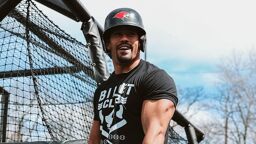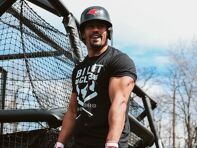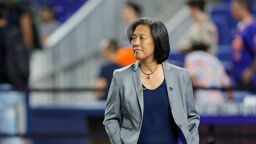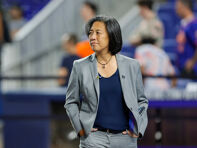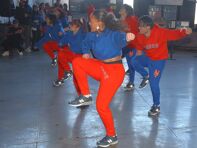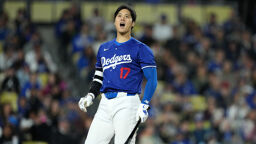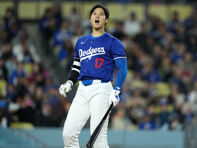An important part of Pride is making the right people uncomfortable.
Normally, you would expect most baseball teams to play it safe when it comes to their Pride celebrations. In Major League Baseball, it’s standard practice for each team’s marketing department to choreograph them so rigidly that they have all the edginess of your average “Chase the rainbow to higher interest rates!” float.
But the Boston Red Sox rewrote the script a bit during Fenway Park’s Pride Night last week. When celebrity chef and Food Network personality Tiffani Faison strode to the mound to throw out the first pitch, she was escorted by Boston drag queens Sassynation, Cole Slaw, and Pamela Manderson.
The same pitcher’s mound that once belonged to Curt Schilling was now being trod by three drag queens in fuchsia leopard-print leotards and giant orange wigs. Whoever made that trade deserves executive of the year.
It was also a sign that the Red Sox were willing to welcome and embrace more aspects of LGBTQ culture than just our wallets.
Tiffani Faison throws out the first pitch in celebration of Pride Night at Fenway Park. @tiffanifaison | #RedSox pic.twitter.com/Hyrlu7tT05
— NESN (@NESN) June 15, 2022
Two nights later, the Mets rang in their Pride Night by inviting Jan from RuPaul’s Drag Race to sing “Take Me Out to the Ballgame.” For one night, “Harry Caray realness” described something other than Ru’s glasses.
Granted, as Alex Reimer pointed out on The Sports Kiki, these on-field moments were about as tame as a group of drag queens gets. But even with that caveat, what’s notable is the fact that two MLB teams welcomed them on the field during a time when the drag community is facing serious threats from opportunistic pundits, social media personalities, and politicians.
It’s a perilous time to be a drag performer when Marjorie Taylor Greene publicly announces her support for a bill to make it illegal for kids to see them. When the ghastly Libs of Tik Tok Twitter account regularly targets drag shows and unleashes the wrath of their 1.3 million followers on their unwitting victims. And especially when the Proud Boys storm a Bay Area library’s drag queen story hour wearing shirts that read “kill your local pedophile.”
Ordinarily, making drag queens part of Pride Night may seem like a small gesture. But in the face of these disturbing developments, spotlighting queens on the field promotes the idea that they are welcome and accepted for who they are.
A dream come true.. growing up my family had season tickets to the Mets! I was at opening day of Citi Field YEARS ago before I even THOUGHT about doing drag, and now I’ll be singing “Take Me Out To The Ballgame”. Needless to say my parents are very proud of me 🥲. Let’s Go Mets!! https://t.co/2ZjBS1VXIM
— Jan Sport (@janjanjan) June 16, 2022
And it should be underscored that they’re being celebrated by an institution as mainstream as MLB. In a time where drag culture is a target, providing a safe space for performers at the ballpark is a big deal.
After all, it’s kind of hard to argue you’re representing “real America” when you’re going against baseball.
It’s important to remember as well that drag queens represent only one segment of the LGBTQ rainbow. For example, some members of the transgender community object to what they believe is a caricature of who they are and one of my trans friends views drag as performing in “trans face.” And certainly not every gay person is a fan of drag, either.
But as evidenced by the turnout during any Pride festival, many in our community celebrate it as a legitimate art form. It’s one that’s currently under attack. But as the last week in baseball demonstrated, drag still has some powerful allies.
The drag gods have spoken. And based on the Mets’ and Red Sox’ current records, they approve.





